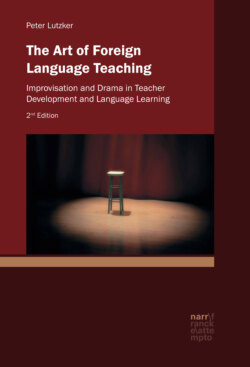Читать книгу The Art of Foreign Language Teaching - Peter Lutzker - Страница 59
На сайте Литреса книга снята с продажи.
6.2.2 Breath
ОглавлениеIn the warm-ups there is a particular attention placed on breath. This corresponds, of course, to many theatrical warm-ups where the control of breathing, particularly in regard to all aspects of voice range and projection plays a central role in training and also in the context of daily exercises. When working with non-professionals, developing a heightened awareness of breath and breathing has different qualities. First, in comparison to the actor who is very well aware of the existential importance of breathing for her work, teachers often need to develop a general awareness of the significance of breath with respect to emotional behaviour and expression:
Breath is linked to the voice and to emotions. When you are tense you tend not to breathe. Of course, you do breathe, but there is a difference between shallow breath and deep breath. Deep breath moves you closer to your emotions whereas shallow breathing is just physiological because you need to breathe to live. When you are restricting your breath, you tend to get tired more quickly. By inviting you to breathe, it opens you to revealing your emotions. (Interview 2)
Developing an awareness of the difference between shallow breathing and deep breathing, first during the warm ups and games and later in the improvisations, becomes a recurring theme in the workshops. Gladwell’s constant injunction during the work – ‘Breathe’ – often provides a moment of necessary release for highly concentrated and sometimes very preoccupied participants:
I often point out to teachers that the way they breathe will affect their classroom. Your breath shows what you are feeling but you are not usually aware of that. By saying, ‘Breathe’ I am saying, ‘Be aware of what your breath is telling you about your feelings and express that.’ When I say to someone, ‘Breathe’ it is always an indication that an emotion is not given its full expression. If you think about it, when you are holding your breath you are usually tense. But in clowning you shouldn’t withhold the expression of that tenseness, you are allowed to be tense, so release your breath, give full expression to your tenseness … If someone holds their breath, it tells me that they are putting effort into holding back what they are feeling. The best way I know of getting someone to be emotionally present to themselves is to say, ‘Breathe’ (Interview 2)
